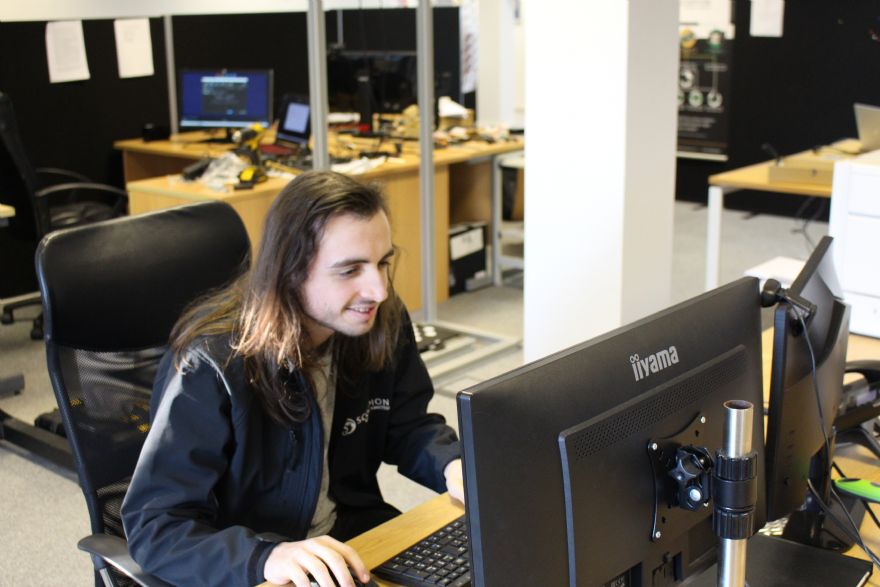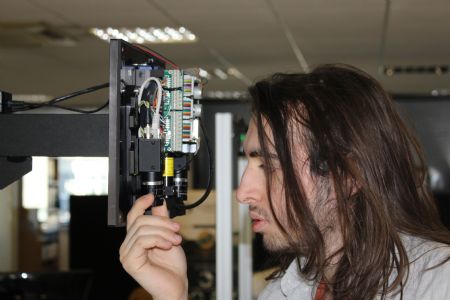 Alex Charles, a machine vision engineer at Scorpion Vision Ltd
Alex Charles, a machine vision engineer at Scorpion Vision LtdParents who despair about the number of hours their children spend glued to video games should take heart — today’s gamers are likely to be the robotic and vision engineers of tomorrow, according to Hampshire-based
Scorpion Vision Ltd.
It is no secret that the UK manufacturing industry is experiencing a massive skills shortage. Indeed, the latest ONS figures show that between August and September this year, the number of vacancies was over 67% higher than pre-pandemic levels .
All areas of manufacturing are struggling to attract new talent but in robotics and vision engineering, the situation is compounded by the post-pandemic boom the sector is experiencing. Demand for 3-D machine vision systems has accelerated with the growing adoption of automation in a range of industries — a trend that, ironically, is being driven in part by the labour crisis.
If robotics and vision engineering is to keep pace with this demand and advance in terms of technology, the sector needs people who are capable of designing, building and programming robotic vision systems. Skills and innovation go ‘hand in hand’. But where is this next generation of talent going to come from?
Many parents today despair about the number of hours that their children spend in darkened rooms playing video games. What they do not realise is that these ‘digital natives’ possess skills that will be extremely valuable in a workplace that is increasingly reliant on digital technology and virtual reality (VR).
As digital technologies become more and more commonplace, engineers will need new skills to take full advantage of them. In other words, tomorrow’s engineers will need both traditional engineering skills and software engineering know-how, including knowledge of 3-D modelling, artifical intelligence (AI) and data science.
Apprenticeships and more flexible, non-traditional learning mechanisms will be crucial to help foster new talent and develop hobby gamers into highly skilled robotic and vision engineers.

Alex Charles, a machine vision engineer at Scorpion Vision, is a great example of how the apprenticeship pathway can be a ‘win-win’ for businesses as well as employees.
A keen gamer with A levels in maths and computer science, Alex knew he wanted to go into a computer science-related career, but was not convinced university was the right route for him. He said: “I think that if you are academic at school, you are often pushed down the university route, but graduates build up a lot of debt and it is not necessarily the best way to gain experience.”
Scorpion Vision’s apprentice scheme, which allows budding vision engineers to learn while in employment, was an attractive alternative. Apprentices spend three days at work and two days studying at college and are paid a full-time wage.
Alex added: “This programme gave me the best of both worlds — I was able to gain hands-on experience by working on projects at Scorpion while studying for an HNC in computing.”
Alex firmly believes that he has learned far more by working on ‘real-life’ build and design projects, and visiting customers than he ever would have done sitting in a lecture theatre or library.
He continued: “By working in industry I have gained skills that simply are not taught on any course curriculum. I have learned how to program robotic vision systems, to trim vegetables accurately, and pick and place products into packaging; I have learned how AI can be harnessed to enhance image processing and I have accumulated lots of knowledge about optics, lenses, cameras and lighting — hardware as well as software.”
Alex has now been at Scorpion Vision for almost three years and his next ambition is to expand his knowledge of AI-based systems by doing an Open University course.
Paul Wilson, managing director at Scorpion Vision, said: “Alex has gone from strength to strength in his time with us and has become one of our most valued and sought after engineers. He is a shining example of how an apprenticeship can benefit both the individual and the business.
“As a company, we have always had very positive experiences with apprenticeships and believe they are one of the most important ways for industry to bridge the skills gap in engineering.”